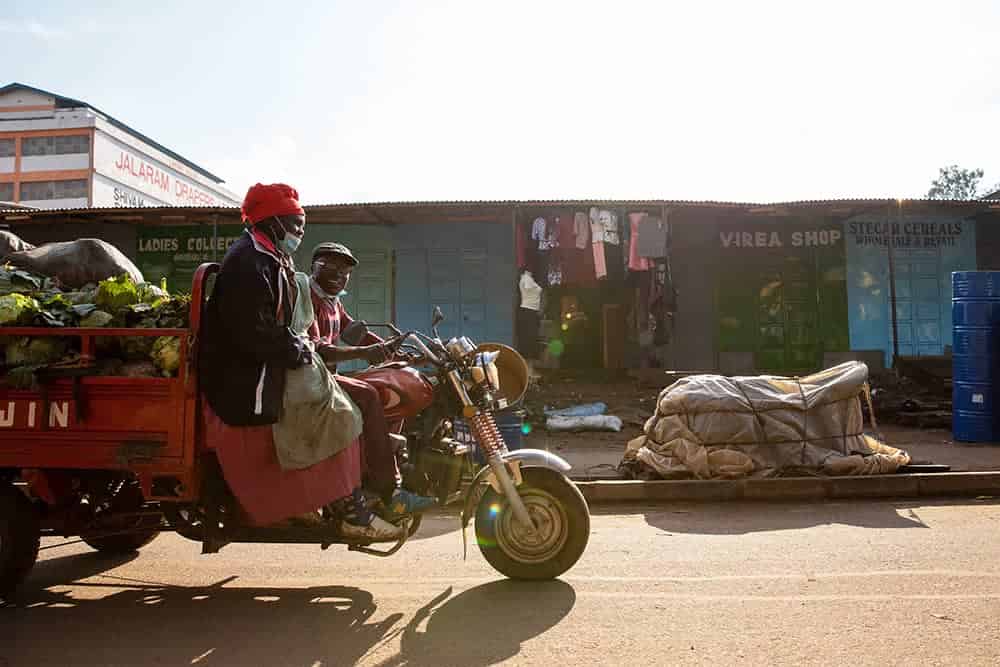Acumen Resilient Agriculture Fund: Investing in Smallholder Farmers

- News
- Agriculture
The $58 million Acumen Resilient Agriculture Fund, sponsored by Acumen and managed by Acumen Capital Partners, helps farmers adapt to climate change and strengthen their livelihoods.
In sub-Saharan Africa, as much as 80% of the food is produced by smallholder farmers. Most of these farmers live in extreme poverty and depend on their seasonal harvest, or livestock, to feed their families and make a living. When an extreme climate event hits, such as drought, flooding, or hail, these farmers have no savings to offset the destruction and income volatility.
Esther and Samuel are smallholder farmers. They have lived and worked in Kitale, Kenya for 30 years. Like many smallholders in sub-Saharan Africa, Esther and Samuel have traditionally relied on rain to water their crops. But climate change has made the rains unreliable and inconsistent, forcing them to adopt new practices to maintain their yields and their incomes.
While the climate crisis has captured the world’s attention and the plight of smallholder farmers is well known, there is little support. Only 5% of investment to overcome climate change is directed toward adaptation, helping farmers and others change their practices and systems to adjust to its effects.
At Acumen, we’ve worked with smallholder farmers for more than a decade, investing more than $30 million of patient capital to increase farmers’ incomes. What we’ve learned aligns with findings from the UN Food and Agriculture Organization: strengthening the agriculture sector is one of the most effective ways to reduce poverty. That’s why we created the $58 million Acumen Resilient Agriculture Fund (ARAF) to support African agribusinesses that are committed to helping farmers build their climate resilience — their capacity to absorb, weather, and bounce back from climate events..
A Focus on Poverty
ARAF’s unique investment thesis — investing in early-stage, high-growth agribusinesses that improve farmer yields and climate resilience to reduce poverty — stems from our expertise in agriculture and experience gained from our first for-profit fund, Kawisafi, which has played a significant role in scaling the off-grid energy sector.
Supporting agribusinesses that help smallholder farmers like Esther and Samuel is central to our mission of tackling poverty. While Acumen’s philanthropically-backed investments have nurtured breakthrough solutions, like Juhudi Kilimo’s innovative loans and Kheyti’s greenhouse-in-a-box, we’ve seen that even the most successful companies do not have the resources to scale. In creating ARAF, we seek to overcome the challenges facing farmers and the agribusinesses that serve them: inadequate resources and a substantial capital gap, limited access to market and poor infrastructure, and, for farmers, a lack of information and credit.
Building ARAF
We recognized that creating a new ecosystem of agribusinesses, one that prioritized impact over immediate financial returns, would be challenging. We knew, through more than a decade of investing in agriculture, that businesses serving smallholder farmers need time to gain trust and must bear the costs of poor infrastructure in rural areas. It was clear that a new investment approach that deploys risk-tolerant, blended capital was needed to sustainably scale agribusinesses that help farmers navigate the impacts of climate change.
But there was no roadmap, no precedent that we could follow. So we worked with our partners and designed a new kind of equity fund that could de-risk investment in resilient agriculture and support early and early-stage growth businesses on their journeys to scale.
New Financial Tools for a New Investment Approach
Unlike traditional investment funds, where each investor enters with the same terms and expectations, ARAF has a first-loss layer funded by a grant from the IKEA Foundation and funding from the Green Climate Fund. The first-loss layer enables investors with a lower risk tolerance — such as development financing institutions — to participate, facilitating a higher close.
ARAF’s long-term investment strategy is designed to scale agribusinesses that offer smallholder farmers critical information, affordable financing, modern inputs, and access to formal markets, and provide them with the accompaniment needed to benefit from their services.
Prioritizing Farmer Needs
ARAF’s purpose is to improve the lives and livelihoods of smallholder farmers in Africa. New research from Acumen — funded by the United Kingdom Foreign, Commonwealth, and Development Office’s Strengthening Impact Investment Markets for Agriculture (SIIMA) program — highlights how agribusinesses can build trust and develop longer lasting relationships with farmers by providing repeat training and instruction on how to best use products and services.
This grassroots approach resulted in a $5 million Technical Assistance Facility (TAF) that is meant to help portfolio companies experiment with new technologies and outreach strategies. This includes farmer training, technical advising, and gender-focused initiatives that drive long-term value for portfolio companies, for ARAF, and for future investment in climate adaptation. The TAF is funded by grants from the Green Climate Fund, IKEA Foundation, the United Kingdom Foreign, Commonwealth, and Development Office, and the Dutch entrepreneurial development bank FMO.
Sub-Saharan Africa represents a large, underserved agriculture market with opportunity for growth. ARAF is poised to disrupt the agriculture sector and build a new ecosystem of agribusinesses that serve smallholder farmers, helping them increase their incomes and build their climate resilience. We are hopeful that ARAF signals a new era of investment in agriculture, one that prioritizes the needs of smallholder farmers and drives increased investment in climate adaptation.
***
The Acumen Resilient Agriculture Fund is sponsored by Acumen, anchored by the Green Climate Fund, and supported by FMO, the Soros Economic Development Fund, Proparco, the Children’s Investment Fund Foundation, Global Social Impact, IKEA Foundations, and others. It is managed by Acumen Capital Partners, a wholly-owned subsidiary of Acumen.